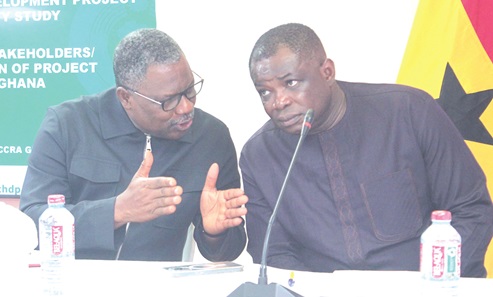The Minister of Roads and Highways, Kwame Agbodza, has launched a national stakeholders’ engagement plan as part of efforts to deepen consultations on the Abidjan-Lagos Corridor Highway Development project.
The event, which took place in Accra yesterday, marked the official commencement of a nationwide campaign to engage communities and stakeholders affected by the project in Ghana.
The Abidjan-Lagos Corridor Highway, a flagship infrastructure initiative under the Economic Community of West African States (ECOWAS), is expected to start in 2027.
It is aimed at enhancing regional integration to boost economic activities. It involves the construction of a four to six-lane dual carriageway spanning 1,028 km to improve road connectivity between five West African countries—Côte d’Ivoire, Ghana, Togo, Benin and Nigeria.
Ghana’s section of the highway is about 520 km—more than half of the entire corridor--- and expected to affect approximately 32 communities.
The route will pass through several key regions, linking major urban centres and facilitating cross-border trade and movement.
As part of the engagement plan, three dedicated teams will be deployed simultaneously to the regions along the proposed corridor route.
Over two weeks, the teams will engage, especially with residents of project-affected communities, traditional authorities, local government officials and opinion leaders, among others, to raise awareness of the project, address community concerns and gather feedback.
Importance
Mr Agbodza, who is the Member of Parliament (MP) for Adaklu in the Volta Region, said that infrastructure development was not only about building roads, but creating meaningful connections between people, communities and economies across West Africa.
He described the initiative as a historic opportunity to unify the region through modern infrastructure, aligning with President John Mahama’s Big Push Agenda and vision of a prosperous, interconnected West Africa.
Mr Agbodza, however, expressed concern over the tendency of some people to take advantage of the project for personal gain.
He cited instances where, after learning that a road would pass through a particular area, people hurriedly constructed buildings on previously vacant lands with the aim of claiming compensation.
The minister said such actions did not only undermine the planning process, but also delayed projects through protracted legal battles when individuals reject fair valuations of their properties.
Delays
The ECOWAS Consultant for Visibility and Communication on the project, David Ndewu, explained that the team was in the country because the highway would significantly impact local communities.
“Some people will lose certain things while others may benefit, and it is crucial to communicate both the potential losses and gains clearly”.
He explained that although initial engagements began as far back as 2013, the long delay was due to the need for proper planning, saying that a major project required a solid foundation and, therefore, must not be rushed.

